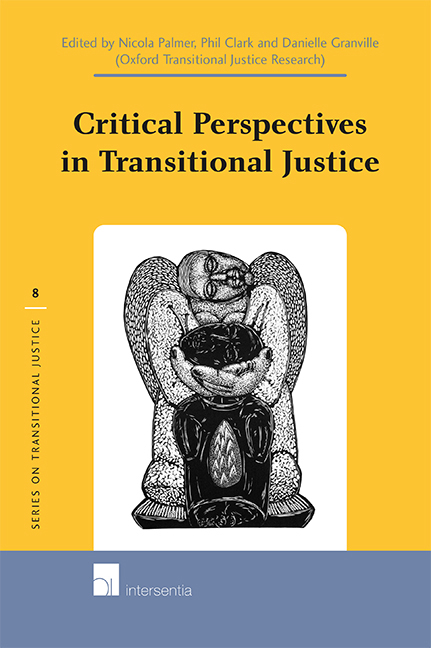Book contents
- Frontmatter
- Note
- Acknowledgements
- Contents
- Abbreviations
- Introduction
- Section 1 Critiquing Core Concepts in Transitional Justice
- Section 2 Accountability, Human Rights and the Rule of Law
- Section 3 Locality and Legitimacy
- Section 4 Memory, Ritual and Apology
- Section 5 Transitional Justice After Transition
- Contributors’ Biographies
- Series on Transitional Justice
17 - “Lebanon of Dignity, a People that Perseveres”: A Psychological Perspective on Collective Amnesia in Lebanon and its Implications for Transitional Justice
Published online by Cambridge University Press: 22 December 2020
- Frontmatter
- Note
- Acknowledgements
- Contents
- Abbreviations
- Introduction
- Section 1 Critiquing Core Concepts in Transitional Justice
- Section 2 Accountability, Human Rights and the Rule of Law
- Section 3 Locality and Legitimacy
- Section 4 Memory, Ritual and Apology
- Section 5 Transitional Justice After Transition
- Contributors’ Biographies
- Series on Transitional Justice
Summary
I love you Lebanon my country. They said “what goes on in the land of festivals strewn as it is with fire and dynamite?” I said “our land is being reborn.” A Lebanon of dignity, a people that perseveres, how could I help loving you, even in your madness I love you.
– Fairuz, Bhibbak Ya LubnanINTRODUCTION
The image of a ‘Lebanon of dignity’ and of ‘a people that perseveres’ captures much of the Lebanese attitude to the ‘fire and dynamite’ they have endured. Drawing on the country's experiences of persistent wars, official responses and methods of remembering and forgetting, this chapter highlights two important avenues of investigation that should be included in the process of designing a transitional justice strategy for Lebanon.
First, I argue that an important tenet missing from the transitional justice debate in Lebanon is the dissection of the concept of ‘collective amnesia’ into a realistic analysis of the ways in which the Lebanese have both forgotten and remembered their past. Samir Khalaf is often attributed with applying this term to Lebanon, and its use has now become commonplace among sociologists, politicians, journalists and the Lebanese general populace. Even the reasons that many Lebanese have opted, both intentionally and unintentionally, for collective amnesia in the wake of violence are well documented. While silence has been cemented by official Lebanese policies and has become an integral part of a societal response to an exceptionally traumatic past, the Lebanese people have also developed varied and unusual ways to remember.
As civil society and government bodies in Lebanon turn to the question of how to deal with the past, the role of collective amnesia is increasingly scrutinised. Yet, with few exceptions, the nature and components of such a collective amnesia remain largely unexplored. This paper disaggregates the concept into nine components and uses a psychological lens to assess the possible contributions and obstacles they pose to transitional justice strategies.
Second, I argue that there is a great deal to be learnt from a psychological analysis of memory and amnesia in post-conflict Lebanon. The primary transitional justice goal for Lebanese civil society seems to be to prevent future violence, and discussions regarding possible strategies have focussed on political, economic and legal analyses.
- Type
- Chapter
- Information
- Critical Perspectives in Transitional Justice , pp. 319 - 346Publisher: IntersentiaPrint publication year: 2012
- 1
- Cited by



